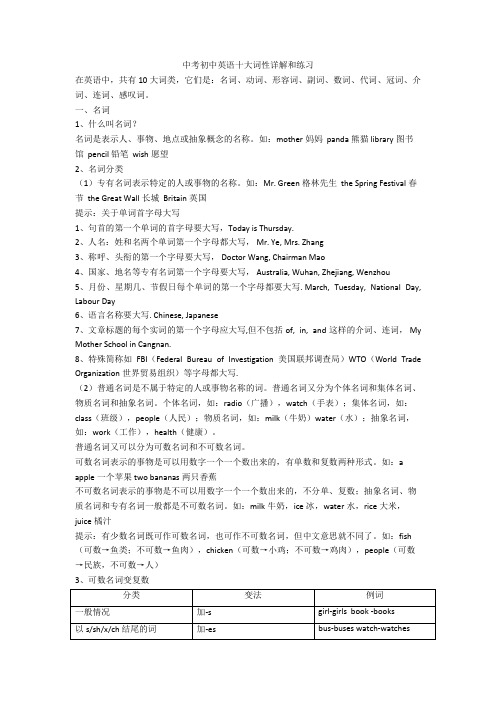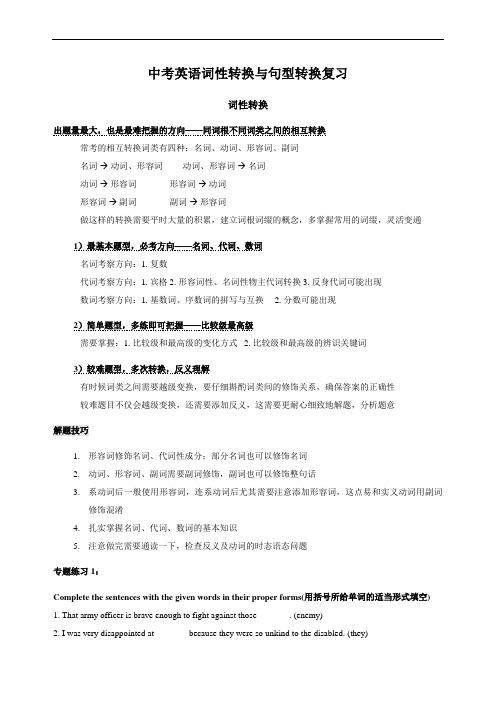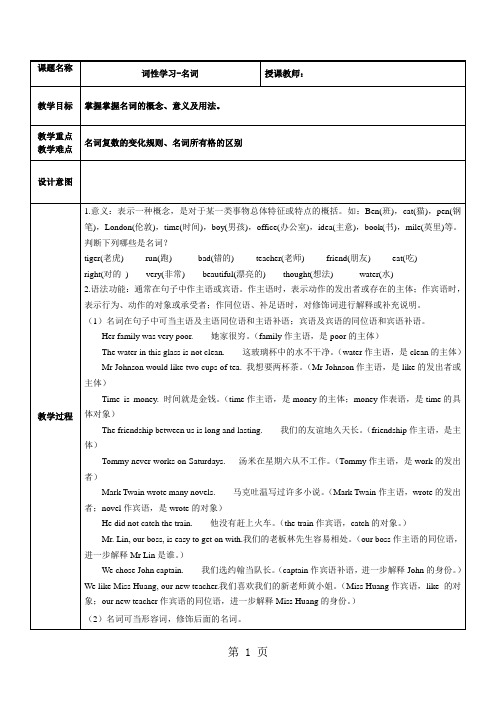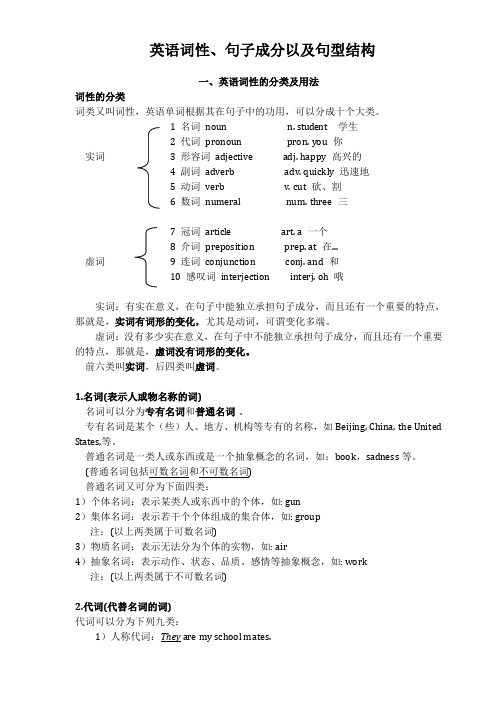中考英语词性复习
中考初中英语十大词性详解和练习

中考初中英语十大词性详解和练习在英语中,共有10大词类,它们是:名词、动词、形容词、副词、数词、代词、冠词、介词、连词、感叹词。
一、名词1、什么叫名词?名词是表示人、事物、地点或抽象概念的名称。
如:mother妈妈 panda熊猫 library图书馆 pencil 铅笔 wish愿望2、名词分类(1)专有名词表示特定的人或事物的名称。
如:Mr. Green格林先生 the Spring Festival春节 the Great Wall长城 Britain英国提示:关于单词首字母大写1、句首的第一个单词的首字母要大写,Today is Thursday.2、人名:姓和名两个单词第一个字母都大写, Mr. Ye, Mrs. Zhang3、称呼、头衔的第一个字母要大写, Doctor Wang, Chairman Mao4、国家、地名等专有名词第一个字母要大写, Australia, Wuhan, Zhejiang, Wenzhou5、月份、星期几、节假日每个单词的第一个字母都要大写. March, Tuesday, National Day, Labour Day6、语言名称要大写. Chinese, Japanese7、文章标题的每个实词的第一个字母应大写,但不包括of, in, and这样的介词、连词, My Mother School in Cangnan.8、特殊简称如FBI(Federal Bureau of Investigation美国联邦调查局)WTO(World Trade Organization世界贸易组织)等字母都大写.(2)普通名词是不属于特定的人或事物名称的词。
普通名词又分为个体名词和集体名词、物质名词和抽象名词。
个体名词,如:radio(广播),watch(手表);集体名词,如:class(班级),people(人民);物质名词,如:milk(牛奶)water(水);抽象名词,如:work(工作),health(健康)。
中考英语词性转换与句型转换复习(含解析)

中考英语词性转换与句型转换复习词性转换出题量最大,也是最难把握的方向——同词根不同词类之间的相互转换常考的相互转换词类有四种:名词、动词、形容词、副词名词→动词、形容词动词、形容词→名词动词→形容词形容词→动词形容词→副词副词→形容词做这样的转换需要平时大量的积累,建立词根词缀的概念,多掌握常用的词缀,灵活变通1)最基本题型,必考方向——名词、代词、数词名词考察方向:1. 复数代词考察方向:1. 宾格 2. 形容词性、名词性物主代词转换 3. 反身代词可能出现数词考察方向:1. 基数词、序数词的拼写与互换 2. 分数可能出现2)简单题型,多练即可把握——比较级最高级需要掌握:1. 比较级和最高级的变化方式 2. 比较级和最高级的辨识关键词3)较难题型,多次转换,反义理解有时候词类之间需要越级变换,要仔细斟酌词类间的修饰关系,确保答案的正确性较难题目不仅会越级变换,还需要添加反义,这需要更耐心细致地解题,分析题意解题技巧1.形容词修饰名词、代词性成分;部分名词也可以修饰名词2.动词、形容词、副词需要副词修饰,副词也可以修饰整句话3.系动词后一般使用形容词,连系动词后尤其需要注意添加形容词,这点易和实义动词用副词修饰混淆4.扎实掌握名词、代词、数词的基本知识5.注意做完需要通读一下,检查反义及动词的时态语态问题专题练习1:Complete the sentences with the given words in their proper forms(用括号所给单词的适当形式填空)1. That army officer is brave enough to fight against those _______. (enemy)2. I was very disappointed at _______ because they were so unkind to the disabled. (they)3. Langping helped the Chinese Women’s Volleyball Team win the gold medal in her _______. (fifty)4. The smart kid is learning to _______ two foreign languages at the same time. (speech)5. Shanghai Disneyland is an _______ park which is popular among visitors. (amusing)6. People show their respect to the _______ policeman for his great deeds. (wound)7. It was surprising that my father dealt with this problem in such a/an _______ way. (usual)8. Traditional Chinese medical treatment is _______ practiced in western countries now. (wide)专题练习2:1.基数词与序数词的互相转换1. Let' s take the lift up to the restaurant on the floor. (twenty)2. Linton is interested in Chinese history and this is his _____ visit to Beijing. (four)3. Our new flat is on the ______ , and we have a good view of the park. (ten)4. Mum made a big chocolate cake for little Kevin’s _____birthday. (six)5. We still need ______more chairs for the meeting room. (ninth)6. Eric, the ______son of the family, has a special interest in physics. (three)7. Alex is _____years old and is taken good care of in the kindergarten. (fourth)8. Climb up to the ___ floor, and you can enjoy a better view. ( eleven)2. 名词变复数1. I received some Christmas _______ from my pen pals. (card)2. The street near my house is always crowded with cars and ______.(bus)3. They bought some _______ at the supermarket yesterday. (potato)4. Many historical ________will be shown on National Day. (movie)5. Joanna received many ______ when graduating from middle school. (gift)6. It is said that eight _____ of water a day can help you keep fit. (glass)3. 人称代词的形式变化1. Billy looks upset. What happened to _____? (he)2. “Would you tell ______ about your trip to Russia?” the children asked Uncle Joe. (we)3. Mandy has got a lovely dog. ______name is Oliver. (It)4. I think the girl is old enough to tie up her shoes by ______. (her)5. Whose school uniform is that on the chair, yours or______? (my)6. Don't worry about your son. He is old enough lo be independent and live by_____. (he)4. 形容词和副词的转换(1)副词转换为形容词1. The exams usually take place at the end of June. (finally)2. On a night, you can see thousands of stars in the sky.(clearly)( 2 )形容词转换为副词1. The children were _____excited when they saw the two pandas, tuantuan and yuanyuan. (real)2. It rained ______ last night and the river rose two feet. (heavy)3 . I can_____ work out the problem. And you? (easy)4. The old lady could hardly believe that she had got the travel pass to Hong Kong so _____. (easy)5. Mary is good at writing. She will _____ be a reporter in the future. (possible)6. Listen! The birds are singing _______ in the woods. (beautiful)7.____, Grace made up her mind to live abroad with her daughter. (final)8. You need to explain your opinions quite ______when having a debate. (clear)9. The young mother is singing ______to her baby son now. (soft)10. With the help of Yellow Pages, we found the address of the theatre _____. (easy)5. 形容词转换为反义词1. It is for an ordinary plane to fly to the moon. (possible)2. Someone thinks the number 13 is an_______number, (lucky)3. It is ______ to improve our English without enough practice.(possible)4. It's ______for him to be so active today as he is always a man of few words. (usual)5.If you don't go on a diet, it is_____for you to lose weight. (possible)6. 名词和形容词之间的转换1. Some famous are going to give lectures in our university in August. (science)2. Lucy looks in Mum's shoes. (fun)3.—What's your________? (national)—Chinese.4.1 don't like the flat here. It's too________.(noise)5. Who's your_______ teacher? (physical)—Mr.Lu.6. Feng Ai’s love and ________ will always be remembered by her students and their parents in Yunnan. (kind)7. The fishermen are told to be more careful on ______ days. (wind)8. More people are getting to know the ________ of environmental protection. (important)9. To be lovely Shanghainese , we should be helpful and ______________ to others. (friend)10. The situation in that country is ______________ . You’d better not go there. (danger)11. It is _______________ of Peter to pay so much money for clothes. (fool)12. Fishing is one of my ________ outdoor activities. (favour)13. The Iraq War has made thousands of children ______________. (home)14. I believe knowledge is more ______________________ than money. (power)15. Shirley has done a lot for the tourists. She is really a ____________ guide. (help)16. It’s difficult for us to tell the ____________ between these two words. (different)17. It was _________ for human beings to predict weather in the past. (difficulty)62. The short play was very ____________ . I laughed from beginning to end. (fun)7. 名词和动词之间的转换1. At the of this century, the APEC conferences were held successfully in Shanghai(begin)2.Telephone_______ are developing very quickly throughout our country.(serve)47. Mr Chen was surprised to see the fast ________ in Shanghai after his long absence from the 3ty. (develop)4 A bus ______ is responsible for the safety of his passengers. (drive)5. I ______ we see a film about the Anti-Japanese War. (suggestion)6. The young man works as a _______ in a five-star hotel. (wait)7. Grandpa is going to ________ his house and live with us. (sale)8. Nowadays too many boys want to become ________. (act)9. The students had a _______ in the English class yesterday. (discuss)10. Put some milk into the flour, break two eggs and then ______ them. (mixture)11. More and more foreigners are learning to _______ Chinese nowadays. (speech)12. Who is the ______ of the book War and Peace? (write)13. It's raining heavily. I'd _____ you call a taxi home now. (suggestion)14. There is a beautiful ______on the wall in each room of my house. (paint)15.local people had to move away because of the serious ______. (pollute)16. Ba Jin is one of the famous_______ in China,8.动词与形容词、副词之间的转换1. Wang Wei, the young pilot, _____for our country. He will live in our hearts forever. (dead)2. In weather, the old had better stay at home.(freeze)3. Many people caught cold last month because of the ________ weather. (change)4. Watch , and you will find the difference between the two pictures. (care)5. ________ food is convenient to cook so it’s a craze in supermarkets. (freeze)6. A group of young Japanese had an _______ tour in our town last month. (enjoy)7. The local people are ________ that the whole nation are helping them rebuild the town. (thank)8. It is a very ____book for language learners lo improve writing skills. (use)9.The movie kungfuPandaII is sure to_____ a large number of teenagers. ( attractive)10. Don’t throw the old watch away. It is still ________. (use)句型转换句型转换考点解析:1. 肯定句变否定句和否定句:常考的考点:have 、do句型2. 反义疑问句:常考的考点:带有否定副词的句子。
史上最全的中考英语语法知识点归纳

史上最全的中考英语语法知识点归纳一、词类和词性1.名词:可数名词、不可数名词、专有名词2.代词:人称代词、物主代词、反身代词、指示代词、不定代词、疑问代词、关系代词3.形容词:形容词的基本用法、比较级和最高级4.副词:副词的基本用法、比较级和最高级5.动词:动词的五种形式、时态、语态、情态动词、动词的非谓语形式6.连词:并列连词、从属连词、状语从句引导词7.介词:基本介词及其用法、固定介词短语8.冠词:不定冠词、定冠词、零冠词9.数词:基数词、序数词、分数词、倍数词10.感叹词:常见感叹词二、句子结构1.句子成分:主语、谓语、宾语、定语、状语、补语2.主谓一致:主语和谓语在人称和数上保持一致3.句型转换:陈述句、疑问句、祈使句、感叹句的转换4.句子的简单句、并列句、复合句、复合句类型(定语从句、状语从句、宾语从句)三、时态和语态1.一般现在时2.一般过去时3.现在进行时4.过去进行时5.一般将来时6.一般过去将来时7.现在完成时8.过去完成时9.现在完成进行时10.一般过去完成进行时11.被动语态四、非谓语动词1.不定式2.动名词3.动词-ing形式五、虚拟语气1.与事实相反的虚拟语气:与现在事实相反的虚拟语气、与过去事实相反的虚拟语气2.与将来事实相反的虚拟语气3.与现在条件相反的虚拟语气4.与过去条件相反的虚拟语气六、定语从句1.关系代词引导的定语从句2.关系副词引导的定语从句3.定语从句的嵌套七、状语从句1.时间状语从句2.地点状语从句3.方式状语从句4.原因状语从句5.条件状语从句6.比较状语从句7.目的状语从句8.结果状语从句八、宾语从句1.宾语从句的引导词2.宾语从句的位置九、名词性从句1.主语从句2.宾语从句3.表语从句十、情态动词1.can和could2.may和might3.will和would4.shall和should5.must和have to6.need和dare以上是中考英语语法知识点的简要归纳,更详细的内容需要根据课本和学习资料进行学习和理解。
中考英语复习词性学习名词

课题名称词性学习-名词授课教师:教学目标掌握掌握名词的概念、意义及用法。
教学重点教学难点名词复数的变化规则、名词所有格的区别设计意图教学过程1.意义:表示一种概念,是对于某一类事物总体特征或特点的概括。
如:Ben(班),cat(猫),pen(钢笔),London(伦敦),time(时间),boy(男孩),office(办公室),idea(主意),book(书),mile(英里)等。
判断下列哪些是名词?tiger(老虎) run(跑) bad(错的) teacher(老师) friend(朋友) eat(吃)right(对的) very(非常) beautiful(漂亮的) thought(想法) water(水)2.语法功能:通常在句子中作主语或宾语。
作主语时,表示动作的发出者或存在的主体;作宾语时,表示行为、动作的对象或承受者;作同位语、补足语时,对修饰词进行解释或补充说明。
(1)名词在句子中可当主语及主语同位语和主语补语;宾语及宾语的同位语和宾语补语。
Her family was very poor. 她家很穷。
(family作主语,是poor的主体)The water in this glass is not clean. 这玻璃杯中的水不干净。
(water作主语,是clean的主体)Mr Johnson would like two cups of tea. 我想要两杯茶。
(Mr Johnson作主语,是like的发出者或主体)Time is money. 时间就是金钱。
(time作主语,是money的主体;money作表语,是time的具体对象)The friendship between us is long and lasting. 我们的友谊地久天长。
(friendship作主语,是主体)Tommy never works on Saturdays. 汤米在星期六从不工作。
(Tommy作主语,是work的发出者)Mark Twain wrote many novels. 马克吐温写过许多小说。
中考英语复习词性与句子成分句型

英语词性、句子成分以及句型结构一、英语词性的分类及用法词性的分类词类又叫词性,英语单词根据其在句子中的功用,可以分成十个大类。
1 名词noun n. stud ent 学生2 代词pronoun pron. you 你实词 3 形容词adjective adj. happy 高兴的4 副词adverb adv. quickly 迅速地5 动词verb v. cut 砍、割6 数词numeral num. three 三7 冠词article art. a 一个8 介词preposition prep. at 在...虚词9 连词conjunction conj. and 和10 感叹词interjection interj. oh 哦实词:有实在意义,在句子中能独立承担句子成分,而且还有一个重要的特点,那就是,实词有词形的变化,尤其是动词,可谓变化多端。
虚词:没有多少实在意义,在句子中不能独立承担句子成分,而且还有一个重要的特点,那就是,虚词没有词形的变化。
前六类叫实词,后四类叫虚词。
1.名词(表示人或物名称的词)名词可以分为专有名词和普通名词.专有名词是某个(些)人、地方、机构等专有的名称,如Beijing, China, the United States,等。
普通名词是一类人或东西或是一个抽象概念的名词,如:book,sadness等。
(普通名词包括可数名词和不可数名词)普通名词又可分为下面四类:1)个体名词:表示某类人或东西中的个体,如: gun2)集体名词:表示若干个个体组成的集合体,如: group注:(以上两类属于可数名词)3)物质名词:表示无法分为个体的实物,如: air4)抽象名词:表示动作、状态、品质、感情等抽象概念,如: work 注:(以上两类属于不可数名词)2.代词(代替名词的词)代词可以分为下列九类:1)人称代词:They are my school mates.2)物主代词:Our friends have great concern for each other.3)反身代词:Take good care of yourselves.4)相互代词:We shoul d help each other.5)指示代词:Who are these peopl e?6)疑问代词:What are you d oing?7)关系代词:She married Li Lei, who is a stud ent too.8)连接代词:Do you know who did it?9)不定代词:Do you know anything about it?代词是非常活跃的词,特别是不定代词,比较复杂,我们要熟练掌握。
初中英语中考常用九类词性的定义及归纳

初中常用的9类词性的定义及归纳词类又叫词性,英语单词根据其在句子中的功用,可以分成十个大类。
1.名词noun n. student 学生2.代词pronoun pron. you 你3.形容词adjective adj. happy 高兴的4.副词adverb adv. quickly 迅速地5.动词verb v. cut 砍、割6.数词numeral num. three 三7.冠词article art. a 一个8.介词preposition prep. at 在...9.连词conjunction conj. and 和10.感叹词interjection interj. oh 哦前六类叫实词(能够单独充当句法成分,有词汇意义和语法意义的是实词),后四类叫虚词(不能充当句法成分,没有词汇意义只有语法意义)。
一、名词1.名词复数的规则变化2.名词的格在英语中有些名词可以加“’s”来表示所有关系,带这种词尾的名词形式称为该名词的所有格,如:a teacher’s book。
3.名词所有格的规则如下:1)单数名词词尾加“’s”,复数名词词尾没有s,也要加“’s”,如the boy’s bag 男孩的书包,men’s room 男厕所。
2)若名词已有复数词尾-s ,只加“’”,如:the workers’ struggle工人的斗争。
二、代词大多数代词具有名词和形容词的功能。
英语中的代词,按其意义、特征及在句中的作用分为:人称代词、物主代词、指示代词、反身代词、相互代词、疑问代词、关系代词、连接代词和不定代词九种。
1.人称代词的用法:I saw her with them,at least,I thought it was her.我看到她和他们在一起,至少我认为是她。
(her做宾语,them做介词宾语,her作主补)a. -- Who broke the vase?--谁打碎了花瓶?b. -- Me.--我。
中考英语常考词汇词性的变换

中考英语常考词汇词性的变换词性变化一1. health n.健康healthy adj. 健康的healthily adv.健康地unhealthy adj.不健康地2. born v.出生birth n.出生birthday n.生日3. happy adj.高兴的,快乐的happily adv.高兴地,快乐地unhappy adj.不高兴的,不快乐的unhappily adv.不高兴地,不快乐地happiness n. 高兴,愉快4. fun n. 乐趣,有趣的事funny adj.有趣的,好玩的5. sad adj. 难过的sadly adj. 难过地sadness n. 难过6. success n.成功successful adj.成功的successfully adv.成功地succeed v.成功7. music n. 音乐musical adj.音乐的musician n.音乐家8. science n. 科学scientist n.科学家scientific adj. 科学的9. report v./n. 报道reporter n.记者10. danger n.危险dangerous adj.危险的endanger v. 危害endangered adj.濒临灭绝的11. hard adj.硬的;困难的;猛烈的adv.努力地;猛烈地hardly adv. 几乎不12. act v.行动active adj. 积极的,活跃的activity n.活动inactivity n. 不活跃的actor n.男演员actress n.女演员action n.行动13. cook v.做饭n. 厨师cooker n.炉子,炊具14. surprise n./v.惊讶;惊奇surprising adj.令人惊讶的surprised adj. 惊讶的15. suggest v.建议suggestion n.建议16. expense n. 费用expensive adj. 贵的inexpensive adj. 不贵的17. decide v.决定decision n.决定18. agree v.同意disagree v.不同意agreement n.同意disagreement n.不同意19. like v. 喜欢dislike v. 不喜欢20. add v. 加addition n.增加additional adj. 额外的21. affect v.影响effect n. 影响22. age n. 年龄aged adj. 年老的23. America n. 美国American adj.美国的n. 美国人24. arrive v.到达arrival n.到达25. Astralia n.澳大利亚Astralian adj. 澳大利亚的n. 澳大利亚人26. beautiful adj.美丽的beautifully adv. 美丽的beauty n. 美丽beautify v.使美丽27. beg v.乞求beggar n. 乞丐28. begin v. 开始beginning n. 开始beginner n.初学者29. bright adj.聪明的;明亮的brightly adv.聪明地;明亮地30. breath n.呼吸breathe v.呼吸31. Britain n.英国British adj.英国的n.英国人32. brother n.兄弟brotherly adj.兄弟般的33. listen v. 听listener n. 听者34. busy adj.忙的business n.生意businessman n. 男商人businesswoman n.女商人35. Canada n. 加拿大Canadian adj. 加拿大的加拿大人的n.加拿大人36. centre/center n. 中心central adj.中心的37. certain adj. 确信,必然的ceitainly adv.一定;当然38. cheer v./n. 欢呼‘cheerful adj.兴高采烈的39. child n.孩子children n.孩子们childhood n. 儿童时代40. China n.中国Chinese adj.中国的n.中国人n.汉语41. choose v.选择choice n.选择42. city n.城市citizen n. 市民43. class n. 班级classroom n.教室classmate n.同学classic adj.经典的classical adj.古典的44. clear adj. 清楚的clearly adv.清楚地45. color n.颜色colorful adj. 色彩鲜艳的46. cloud n.云cloudy adj.多云的47. collect v.收集collection n.收藏collector n.收藏家48. creat v.创造creative adj.创造性的creation n.创造力creator n.创造者49. cross v. 穿过across prep. 穿过crossroad n.十字路口crossing n.路口50. crowd n. 人群crowded adj.拥挤的uncrowded adj.不拥挤的51. cycle v.骑车cyclist n. 骑车人52. dark adj. 黑暗的darkness n.黑暗darken v.变暗53. day n. 天daily adj. 日常的54. deep adj.深的deepen v. 加深depth n. 深度55. dirt n.灰尘,尘土(指脏东西,泥土,污垢等)dirty adj. 肮脏的56. dust n.灰尘,尘土(很簿一层脏东西)dusty adj.布满灰尘的duster n. 抹布dustman n.垃圾工56. down adv.向下downstairs adv.到楼下upstairs adv.到楼上57. draw v.画drawer n. 抽屉drawing n. 图画58. drive v.驾驶driver n.司机59. end n./ v.结束ending n. 结尾endless adj. 无尽的60. engine n. 发动机engineer n.工程师engineering n.工程61. joy n. 高兴enjoy v.喜欢enjoyable adj.使人愉快的62. enter v.进入entrance n.入口exit n.出口63. excite n.兴奋exciting adj.令人兴奋的excited adj. 感到兴奋的excitement n.兴奋64. true adj. 真的truth n. 事实truly adv. 真实地65. fair adj.公平的unfair adj. 不公平的66. farm n. 农场farmer n. 农民farming n.务农67. father n. 父亲fatherly adj.慈父般的68. favour n. 恩惠favourite adj. 最喜爱的69. final adj.最后finally adv.最后70. fire n.火fireman n. 消防员firework n.烟火71. fish n.鱼fisherman n. 渔夫72. fly v. 飞flight n. 航班73. fog n.雾foggy adj. 有雾的74. follow v.听从,跟从following adj.下面的75. fool v.愚弄,欺骗n. 愚人,白痴foolish adj.笨的,愚蠢的76. foreign adj. 外国的foreigner n.外国人77. forget v.忘记forgetful adj. 健忘的forgettable adj. 难忘的78. France n.法国French adj.法国的n.法国人,法语79. free adj.自由的;免费的freedom n.自由80. friend n.朋友friendly adj.友好的friendship n.友谊81. frighten v.使害怕frightening adj.令人恐惧的frightened adj. 受惊吓的82. Germany n.德国German adj.德国的n.德国人;德语83. gold n.金,黄金golden adj. 金色的84. guilt n. 内疚;犯罪guilty adj. 内疚的;犯罪的guiltily adv. 内疚地;犯罪地85. head n. 头headache n. 头痛headmaster n. 校长86. hot adj. 热的heat n.热87. heavy adj. 重的heavily adv. 大量地;沉重地;严重地88. help v./n.帮助helpful adj. 有帮助的helpless adj. 无助的89. high adj. /adv. 高的/地height n.高度highly adv.高度地,非常highrise n.高层建筑90. home n.家homeless adj. 无家可归的homesick adj. 想家的91. hungry adj. 饥饿的hunger n.饥饿hungrily adv. 饥饿地92. hurry n./v.匆忙hurried adj.匆忙的hurriedly adv. 匆忙地93. ill adj. 生病的illness n.生病94. immediate adj. 立刻的immediately adv. 立刻95. job n. 工作jobless adj. 失业的96. juice n.果汁juicy adj. 多汁的97. kind adj. 友好的kindness n. 仁慈;好意kindly adv.慈祥地unkind adj.不友好的98. late adj./adv. 迟的/地lately adv.最近latest adj. 最近的99. laugh v. 大声笑laughter n. 笑,笑声laughing adj.笑的;带笑意的100. use v./n. 用useful adj. 有用的useless adj. 无用的101. live v. 居住life n. 生活;生命lively adj. 生动的alive adj. 活着的living adj.活着的102. lone adj.独自的lonely adj. 孤独的alone adj./adv. 独自的/地103. long adj. 长的length n. 长度104. lose v. 丢失loser n.失败者loss n. 丢失lost adj. 迷路的105. loud adj. 大声的loudly adv. 大声地aloud adv. 大声地注:大声读书用aloud,loudly有喧闹的意思106. love v. 爱lovely adj.可爱的107. main adj. 主要的mainly adv. 主要地108. mad adj.疯狂的madly adv.疯狂地109. meet v.遇见meeting n.会议110. miss v.想念;错过missing adj.丢失的111. mother n. 母亲motherly adj.慈母般的112. mouse n.老鼠; 鼠标mice 老鼠复数mouses 鼠标复数113. move v.移动;搬家moving adj. 令人感动的moved adj.感动的114. sun n.太阳sunny adj.晴朗的115. noise n. 噪音noisy adj. 吵闹的116. north n.北方adj.北方的northern adj. 北方的注:north有政治或社会意义northern 只表方位117. office n. 办公室officer n. 官员official adj. 官员的officially adv. 官方地118. one num. 一once n. 一次first num.第一119. open v.开adj.开着的;营业的opening n.开幕,开始openly adv. 公开地;坦率地120. pack v.打包,包裹package n. 包裹121. pain n.痛苦painful adj.痛苦的词性变化二1. differ v.与……不同different adj. 不同的differently adv.不同地difference n.不同,区别2. usual adj. 通常的,平常的usually adv. 通常地,经常地unusual adj. 不寻常的unusually adv. 不寻常地usualness n. 经常性,惯常unusualness n. 不寻常性3. balance n./v.平衡,协调balanced adj.平衡的4. anger n.愤怒,生气angry adj. 生气的angrily adv.生气地5. important adj.重要的unimportant adj. 不重要的importance n.重要,重要性6. babysit v.临时照顾babysitter n. 临时保姆7. worry v. 担心,忧虑worried adj. 担心的,忧虑的8. week n. 周,星期weekday n.工作日weekend n. 周末9. train n.火车v. 培训training n.培训10. chemist n.化学家,药剂师chemistry n. 化学chemical adj.化学的11. interest n. 兴趣v. 使……有兴趣interesting adj. 有趣的interested adj.感兴趣的12. necessary adj.必要的unnecessary adj.不必要的necessarily adv. 必要地13. care n./v.照顾,在意careful adj.小心的,认真的carefully adv. 小心地,认真地careless adj.粗心的carelessly adv. 粗心地14. harm n.伤害harmful adj.有害的harmless adj. 无害的15. instruct v.命令,指示instruction n.命令,指示16. luck n.幸运lucky adj.幸运的unlucky adj. 不幸的luckily adv.幸运地unluckily adv.不幸地17. record n./v.记录recorder n.记录;录音机18. nation n. 国家,民族national adj.国家的,民族的nationality n. 国籍19. talent n.天才talented adj. 天才的,有天赋的20. attend v.参加attentive adj. 集中精神的attentively adv. 集中精神地;专注地attention n.注意21. move v.移动, 搬动movement n.活动,运动moving adj.令人感动的22. build v.建造building n.建筑物,楼房builder n. 建筑工人,建筑者23. comfort v.安慰n.舒适comfortable adj.舒适的,舒服的uncomfortable adj.不舒服的comfortably adv.舒服地24. pollute v.污染polluted adj. 被污染的pollution n.污染,污染物25. predict v. 预言,预测prediction n.预言,预测predictor n.预言者26. simple adj.简单的simply adv.简单地27. possible adj.可能的possibly adv.可能地impossible adj.不可能的impossibly adv. 不可能地28. electric adj.带电的electricity n. 电,电能29. argue v. 争吵argument n.争吵30. fail v.失败,不及格failure n.失败,不及格31. press v.按,压pressure n.压力32. include v.包括including prep. 包括inclusion v. 包括,包含33. organize v. 组织organizer n. 组织者organized adj.有组织的organization n. 组织34. hope v.希望hopeful adj. 有希望的hopeless adj. 绝望的35. imagine v.想象imagination n.想象力imaginative adj.富有想象力的36. strange adj.奇怪的,陌生的stranger n.陌生人strangely adv. 奇怪地37. amaze v. 使吃惊amazing adj. 令人吃惊的amazed adj.感到吃惊的amazement n.惊奇38. scare v.使害怕scared adj. 害怕的39. murder v./n. 谋杀murderer n. 杀人犯40. silent adj. 沉默的silence n.沉默41. mean v.意思是meaning n. 意思42. nerve n. 神经nervous adj.紧张的43. wait v. 等待waiter n. 男服务员waitress n. 女服务员44. village n. 村庄villager n.村民45. experience n.经验;经历experienced adj.有经验的46. safe adj. 安全的safely adv.安全地safety n.安全save v.救47. injure v.伤害,损害injured adj. 受伤的(injured也是injure的过去式)injury n.伤害48. law n. 法律lawyer n.律师49. collect v.收集collection n. 收藏品collector n.收藏者50. learn v. 学习learner n. 学习者51. certain adj.确实的,无疑的certainly adv.当然,一定52. annoy v. 使恼怒,生气annoying/annoyed adj. 恼怒的,生气的53. polite adj.有礼貌的politely adv.有礼貌地impolite adj.没礼貌的impolitely adv.没礼貌地54. behave v.行为,兴止behavior n.行为,举止55. normal adj.正常的normally adv.正常地abnormal adj. 不正常的56. person n.人personal adj. 私人的,个人的personally adv.就本人而言57. special adj.特别的specially adv. 特别地specialist n.专家58. advantage n.有利条件,优点disadvantage n.不利条件,缺点59. encourage v. 鼓励encouragement n.鼓励60. suggest v.建议suggestion n. 建议61. attract v.吸引attraction n.吸引attractive adj.吸引人的,有魅力的62. fear n./v.害怕fearful adj.可怕的fearless adj. 无畏的63. bravery n. 勇气brave adj.勇敢的bravely adv.勇敢地64. nature n.大自然natural adj.自然的,自然界的naturally adv.自然地65. develop v.发展development n.发展developed adj. 发达的developing adj. 发展中的66. difficult adj.困难的difficulty n. 困难67. disppoint v. 使失望disappointing adj.令人失望的disppointed adj.失望的disppointment n. 失望68. discuss v. 讨论discussion n.讨论69. electric adj.电的electricity n.电electrical adj.电力的70. embarrass v.使尴尬embarrassing adj.尴尬的embarrassed adj. 令人尴尬的embarrassment n. 尴尬71. interview v. 采访interviewer n. 采访者72. introduce v. 介绍indroduction n. 介绍,说明73. library n. 图书馆librarian n. 图书管理员74. manage v. 管理,经营manager n. 经理management n. 管理,经营75. marry v. 结婚married adj. 已婚的76. mean v. 意思是meaning n. 意思meaningful adj. 意味深长的77. medicine n. 药medical adj. 医疗的78. message n. 信息messenger n. 送信人79. mistake n. 错误v. 误会mistaken adj. 错误的80. mix v. 混合mixture n. 混合物81. month n. 月monthly adj. 每月的82. nation n. 民族national adj. 民族的;国家的nationality n. 国籍internation n. 国际international adj. 国际的83. near prep./adj. 附近nearly adv. 几乎84. neighbour n. 邻居neighbourhood n. 社区,住宅区85. peace n. 和平peaceful adj. 和平的86. perfect adj. 完美的perfection n. 完美87. physics n. 物理physical adj. 物理的;身体的88. pity n. 同情pitiful adj. 有同情心的89. post v. 寄postage n. 邮费postman n. 邮递员90. power n. 力量powerful adj. 强大的91. practice n./v. 练习practise v. 练习92. prepare v. 准备preparation n. 准备93. present adj. 出席的presence n. 出席94. price n. 价格priceless adj. 无价的95. pride n. 骄傲proud adj. 骄傲的96. print v. 印刷printer n. 印刷工printing n. 印刷97. prison n. 监狱prisoner n. 犯人98. proper adj. 恰当的properly adv. 恰当地improper adj. 不恰当的improperly adv. 不恰当地99. quick adj. 快的quickly adv. 快地quicken v. 加快100. quiet adj. 安静的quietly adv. 安静地101. rain n./v. 雨,下雨rainy adj. 有雨的102. rapid adj. 迅速的rapidly adv. 迅速地102. rare adj. 罕见的rarely adv. 罕见地103. real adj. 真的really adv. 真地realize v. 意识到;实现104. reason n. 原因,理由reasonable adj. 合乎情理的105. resent adj. 最近的resently adv. 最近地106. record v./rɪˈkɔːd/记录n. /ˈrekɔːd /记录recorder n. 录音机107. relate v. 有联系relation n. 关系relative adj. 有关系的108. rule n.规则ruler n. 尺子109. run v. 跑runner n. 赛跑的人110. salt n. 盐salty adj. 咸的111. satisfy v. 使满意satisfying adj. 令人满意的satisfied adj. 感到满意的112. say v. 说saying n. 谚语113. sure adj. 确信的surely adv. 确信地114. sharp adj. 锐利的sharpen v. 削尖sharpener n. 削笔刀115. short adj. 短的shorts n. 短裤shorter v. 缩短116. sight n. 视野,风景点sightseeing n. 观光eyesight n. 视力117. similar adj. 相似的similarly adv. 相似地118. simple adj. 简单的simply adv. 简单地119. sit v. 坐seat n. 座位120. slow adj. 慢的slowly adv. 慢地121. smart adj. 聪明的smartly adv. 聪明地122. smoke v. 吸烟smoker n. 吸烟者smoky adj. 冒烟的123. snow n./v. 雪,下雪snowy adj. 下雪的smowman n. 雪人124. soft adj. 软的softly adv. 温柔地; 软地125. space n. 太空spaceship n. 宇宙飞船126. speak v. 讲speaker n. 讲话的人speech n. 演讲spoken adj. 口头的127. spell v. 拼写spelling n. 拼写128. stone n. 石头stony adj. 铁石心肠129. storm n. 暴风雨stormy adj. 有暴风雨的130. strength n. 力量,力气strengthen v. 加强,变强131. strong adj. 强壮的strongly adv. 强壮地132. survive v. 幸存survival n. 幸存survivor n. 幸存者133. taste v. 品尝tasty adj. 美味的134. teach v. 教teacher n. 老师135. terrible adj. 可怕的,糟糕的terribly adv. 可怕地,糟糕地136. thank v. 感谢thankful adj. 感激的137. think v. 想,思考thinker n. 思想家thought n. 思想,想法,主意(也是think的过去式及过去分词)thoughtful adj. 想得周到的,体帖的,沉思的138. thirsty adj. 渴的thirstily adv. 渴地;渴望地139. threat n. 威胁threaten v. 威胁,恐吓140. visit v. 参观visitor n. 参观者141. warn v. 警告warning n. 警告142. waste v. 浪费wasteful adj. 浪费的143. weak adj. 虚弱的weaken v. 使虚弱的144. week n. 星期weekday n. 工作日weekend n. 周末weekly adj. 每周的145. weigh v. 称重量weight n. 重量146. west n. 西方western adj. 西方的147. wide adj. 宽的,广泛的widely adv. 广泛地widen v. 加宽148. win v. 赢winner n. 获胜者149. wind n. 风windy adj. 有风的150. wise adj. 明智的,聪明的wisdom n. 明智,智慧151. with prep. 和..,一起;具有;用within prep. 在...之内without prep. 没有152. wonder v. 想知道wonderful adj. 精彩的153. worry v. 担心worried adj. 担心的154. worth v. 价值worthy adj. 有价值的worthless adj. 无价值的155. paint v. 画painter n. 画家painting n. 画词性变化三1. pronounce v. 发音pronounciation n.2. frustrate v. 使失望,沮丧frustrating/frustrated adj.3. impress v. 使感动,使印象深刻impressing/impressed adj. impression n. 印象,感觉4. die v. 死dead adj. 死的death n. 死亡deadly adj. 致命的5. patient adj. 有耐心的n. 病人patience n. 耐心impatient adj. 没耐心的impatience n. 没耐心6. concentrate v. 集中,专心concentration n.7. design v. 设计designer n. 设计师8. sleepy adj. 困倦的,想睡的sleepless adj. 失眠的,睡不着的9. obey v. 服从disobey v. 不服从appear v. 出现disappear v. 消失like v. 喜欢dislike v. 不喜欢agree v. 同意disagree v. 不同意honest adj. 诚实的dishonest adj. 不诚实的advantage n. 优点disadvantage n. 缺点10. important adj. 重要的importance n. 重要性unimportant adj. 不重要的unimportantly adv. 不重要地11. tradition n. 传统traditinal adj. 传统的12. nature n. 自然natural adj. 自然的13. energy n. 精力,能量energetic adj. 有活力的,精力充沛的14. realist n. 现实主义realistic adj. 现实的;注意实际的15. confident adj. 自信的confidence n. 信心16. permit v. 允许;许可permission n. 允许17. annoy v. 使生气,使气愤annoying/annoyed adj.18. know v. 知道knowledge n. 知识knowledgeable adj. 知识渊博的;有见识的20. cover v. 遮盖,遮掩discover v. 暴露,发现21. refuse v. 拒绝refusal n. 拒绝22. history n. 历史historical adj. 历史的historic adj. 历史上有名的23. possible adj. 可能的possibly adv.impossible adj. 不可能的24. honest adj. 诚实的honesty n. 诚实dishonest adj. 不诚实的dishonesty n. 不诚实25. own v. 拥有adj. 自己的owner n. 所有者,主人26. photograph n. 照片photographer n. 摄影师,拍照者photography n. 摄影,照相27. miss v. 错过,遗漏;想念,思念missing adj. 缺少的,丢失的,失踪的28. suggest v. 显示,表明,暗示,建议suggestion n. 建议29. educate v. 教育,培养education n. 教育,学业educational adj. 教育的,有教育意义的educator n. 教育家,教师educated adj. 受过教育的30. tour n./v. 旅游tourist n. 游客touristy adj. 游客很多的;适合浏览的31. warm adj. 温暖的warmth n. 温暖32. include v. 包含,包括including prep.33. translate v. 翻译translation n. 翻译translator n. 翻译家34. sail n. 帆,帆船sailor n. 水手sailing n. 航行35. continue v. 继续discontinue v. 停止36. program v. 编程,计划programmer n. 程序师,程序设计员programming n. 编程,设计37. hungry adj. 饥饿的hunger n. 饥饿hungrily adv.38. home n.homeless adj. 无家可归的use n./v.useless adj. 无用的hope n./v.hopeless adj. 无望的care n./v. 关心,小心careless adj. 粗心的end n./v. 结束,末尾endless adj. 没完没了的,无尽的39. advertise v. 做广告advertisement n. 广告argue v. argument n. 争论excite v. excitement n. 兴奋40. please v. 使满意,使愉快pleased adj. 高兴的pleasure n. 愉快,快乐displeasure n. 不高兴,不愉快pleasant adj. 愉快的,欢乐的pleasantly adv. 愉快地41. imagine v. 想象imagination n.imaginative adj42. invent v. 发明,编造inventor n. 发明家invention n. 发明43. operate v. 操作,经营,做手术operation n. 操作,经营,做手术operator n. 操作者44. produce v. 生产,制造product n. 工业产品production n. 精神产品; 生产(如电影,电视剧等)productive adj. 生产的45. create v. 创造,创作,创建creation n.creative adj. 有创造力的creature n. 生物46. lock n./v. 锁unlock v. 开销47. improve v. 提高,改善improvement n. 提高,改善48. exhaust v. 使精疲力竭ehausted/exhausting adj.49. announce v. 宣布,通告anouncer n. 宣布者,播音员announcement n. 宣告,通告50. magic n. 魔术,魔力adj. 魔术的,有魔力的magical adj. 有魔力的,奇妙的magician n. 魔术师,巫师51. crowd n. 人群v. 拥挤, 挤满crowded adj. 拥挤的,挤满的uncrowded adj. 不拥挤的52. safe adj. 安全的safety n. 安全safely adv. 安全地53. invite v. 邀请invitation n. 邀请,邀请函54. relax v. 放松relaxing/relaxed adj.relaxation n.55. greet v. 问候;向…打招呼greeting n.56. perform v. 表演performance n. 表演57. rude adj. 粗鲁的,无礼的rudely adv rudeness n. 58. type v. 打字n. 种类typist n. 打字员typewriter n. 打字机59. amuse v. 娱乐,使愉快amusement n. 娱乐,乐趣amusing adj. 引人发笑的amused adj. 感到好笑的60. science n. 科学,理科scientist n. 科学家scientific adj. 科学的61. serve v. 服务,招待service n. 服务servant n. 仆人62.detect v. 发现,探测detective n. 侦探detector n. 探测器63. shine v. 发光,照耀shining v. 光亮的,华丽的shiny adj. 有光泽的,光亮的64. confuse v. 使糊涂,使困惑confused/confusing adj.65. mislead v. 误导misleading adj. 令人误解的lead v. 引导,引领leader n. 领导66. truth n. 事实,真相truthful adj. 诚实的67. taste n. 品味,审美力,鉴赏力v. 尝起来tasteful adj. 有鉴赏力的tasty adj. 美味的tasteless adj. 无味的,粗俗的68. wood n. 木头,木材wooden adj. 木制的wool n. 羊毛woolen adj. 羊毛的gold n. 金子golden adj. 金的69. appear v. 出现,露面;(公开)演出系动词:看起来,好像appearance n. 外貌;出现disappear v. 消失disappearance n. 消失70. spot n. 斑点v. 弄脏,留下污点;看见,发现spotted adj. 有斑点的71. polluted v. 污染polluted adj. 被污染的pollution adj. 污染,污染物72. attract v. 吸引attractive adj. 有吸引力的73. express v. 表达,表示expression n. 表达,表情74. inspire v. 鼓舞,激励inspired adj. 受到灵感启发的inspiration n. 灵感,鼓舞人心的人或物75. society n. 社团,社会social adj. 社会的,有关社会的socialist adj. 社会主义的76. depend v. 依靠dependent adj. 依靠的dependence n. 依靠independent adj. 独立的independence n. 独立性77. disable v. 使伤残disabled adj. 残疾的78. distant adj. 遥远的distance n. 距离79. able adj. 有能力的ability n. 能力enable v. 使能够unable adj. 无能力的80. absent adj. 缺席的absence n. 缺席81. accident n. 事故accidental adj. 意外的82. admire v. 钦佩admirable adj. 值得钦佩的83. culture n. 文化cultural adj. 文化的84. custom n. 风俗customer n. 顾客customs n. 海关85. delight n. 高兴delighted adj. 高兴的delightful adj. 令人愉快的86. determine v. 决定determined adj. 坚定的determination n. 决心87. environment n. 环境environmental adj. 环保的88. Europe n. 欧洲European adj. 欧洲的n. 欧洲人89. familiar adj. 熟悉的unfamiliar adj. 不熟悉的90. fortune n. 运气fortunate adj. 幸运的fortunately adv. 幸运地unfortunate adj. 不幸的unfortunately adv. 不幸地91. freeze v. 结冰freezing adj. 极冷的frozen adj. 冰冻的92. lecture n. 演讲lecturer n. 演讲者93. locate v. 位于,找出...准确位置location n. 位置local adj. 当地的94. motor n. 发动机,汽车motorcycle n. 摩托车95. poison n. 毒药poisonous adj. 有毒的96. profession n. 职业professional adj. 职业的97. promise v. 承诺promising adj. 有前途的98. promote v. 促进promotion n. 促进99. regular adj. 有规律的irregular adj. 无规律的100. second n./num.第二secondary adj.中等的101. serious adj. 严重的seriously adv. 严重地102. solve v. 解决solution n. 解决方法103. sympathy n. 同情sympathize v. 同情sympathetic adj. 同情的104. translate v. 翻译translation n. 翻译translator n. 翻译员105. value n./v. 价值valuable adj. 有价值的invaluable adj. 无价的106. visible adj. 可见的invisible adj. 看不见的。
2024年中考英语专题复习---形容词和副词课件

3. 按功用分类需掌握的几类副词: (1) 句子副词:luckily, actually, traditionally等,通常 修饰整个句子。 (2) 连接副词:besides, however等,在句子和分句之 间起连接作用。 (3) 疑问副词:how, where, when, why, how long, how soon, how often, how far 等,用来引导特殊疑问句。 (4) 缩合连接副词(关联词):how, where, when, 等, 可用来连接宾语从句。 (5) 关系副词:when, where, why等,用来引导定语从 句。
(2) 表示一方在某一方面不及另一方时 :not as/so + adj./adv.原形 + as
Tom isn’t as/so tall as me. I don’t sing as/so loudly as my sister.
A + less adj./adv.原级+than + B
形容词、副词的比较级 、最高级
形容词、副词的级
多数形容词和副词有三个等级:原级、比较级和 最高级。
(一)原级:即形容词或副词的原形。原级前可 用very,quite,too,enough,so等副词修饰。
I’m very hungry. My sister runs quite fast.
(1) 表示两者在某一方面相同:as + adj./adv.原形 + as This dress is as beautiful as that one. Linda sings as well as Amy.
形容词和副词比较级的构成:+er/more; 最高级的构成:+est/most
- 1、下载文档前请自行甄别文档内容的完整性,平台不提供额外的编辑、内容补充、找答案等附加服务。
- 2、"仅部分预览"的文档,不可在线预览部分如存在完整性等问题,可反馈申请退款(可完整预览的文档不适用该条件!)。
- 3、如文档侵犯您的权益,请联系客服反馈,我们会尽快为您处理(人工客服工作时间:9:00-18:30)。
第三讲词性一.名词一.名词---noun缩写为 n.名词可以分为专有名词(Proper Nouns)和普通名词 (Common Nouns),专有名词是某个(些)人,地方,机构等专有的名称,如Beijing,China等。
普通名词是一类人或东西或是一个抽象概念的名词,如:book, milk等。
普通名词又可分为下面四类:1)个体名词(Individual Nouns):表示某类人或东西中的个体,如:boy , cat 。
2)集体名词(Collective Nouns):表示若干个个体组成的集合体,如:family ,class。
3)物质名词(Material Nouns):表示无法分为个体的实物,如:milk ,air。
4)抽象名词(Abstract Nouns):表示动作、状态、品质、感情等抽象概念,如:work , help。
二.名词的可数与不可数①物质名词与抽象名词一般无法用数目计算,为不可数名词。
不可数名词前不能加冠词a 或an来表示量,也没有复数形式。
要表示“一个(只,块,张。
)”的概念,须加a piece of … , a bowl of …, a drop of …等。
表示“一些,许多”可用:some, any, a little, little, a lot of ,lots of , much, 等常见的不可数名词有:news work weather paper fruit bread wood air chalk②集体名词象people, police,trousers, scissors只有复数形式。
③有的名词在表示某一词义时是可数名词,而表示另一词义时又是不可数名词。
Glass, chicken, paper, exercise, orangeroom 房间(可);空间(不)time 次 (可);时间(不)glass 眼镜,玻璃杯(可);玻璃(不)小结:根据以上分析,也就是说,可数名词的单数表示的是单位一,它的前面可以接a, an, the, this, that, my, his, her, its, Tom’s 等等这些词。
其复数则一般要在该词后加-s或是其它的变化(我们叫规则和不规则变化)见下文分析:三.名词的数的变化可数名词有复数形式,分为规则和不规则变化,1.规则变化①直接加-s如:book, pen teacher student. Etc②加-es 以x, s, (t)ch, sh 结尾的可数名词,如:box,glass, watch, match, dish , wish.③以辅音字母加y 结尾,去y变i 加-es如:story, country, city, factory dictionary family baby.注意:以元音字母加y结尾的则直接加s.如:key, monkey, boy, toy, way, play(戏剧)④以f 或fe结尾,变f为v 加-es如:knife, leaf, shelf, thief, wife , half.2.不规则变化1)child---children foot(脚)---feet tooth(牙齿)---teethmouse(老鼠)---mice man---men woman---women注意:与 man 和 woman构成的合成词,其复数形式也是 -men 和-women。
如: an Englishman,two Englishmen. 但German(德国人)不是合成词,故复数形式为Germans;Bowman是姓,其复数是the Bowmans(Bowman的一家)。
2)单复同形如:deer(鹿), sheep(绵羊), Chinese, Japaneseli(厘),jin(斤),yuan(元),two li,three mu(亩),four jin但除人民币元、角、分外,美元、英镑、法郎等都有复数形式。
如: a dollar, two dollars. 总之,中国的单位没有复数而国外的有。
3)集体名词,以单数形式出现,但实为复数。
如:people(人) police(警察) cattle(牲口) 等本身就是复数,不能说 a people,a police,a cattle,但可以说a person,a policeman,a head of(一头)cattle。
此外, French(法国人),Chinese,Japanese,Swiss(瑞士人) 等名词,表示国民总称时,作复数用,前面要用the。
如:The Chinese are industries and brave. 中国人民是勤劳勇敢的。
二.代词1.人称代词的主格和宾格主格:在句中充当主语。
宾格:在动词或介词后面充当宾语。
2.物主代词。
包括形容词性和名词性的物主代词。
形容词性的物主代词后面必须有名词,名词性物主代词后面不可有名词,但要注意单复数。
例:You have more apples than I, buy mine are better than yours. (此处的mine指my apples,是复数)。
3.反身代词,myself, themselves等.①特别注意yourself有复数形式是yourselves例:“Enjoy_______(you) ,” He said to the children. 此处用yourselves.②反身代词用于一些固定的短语。
如:hurt oneself, enjoy oneself, help oneself to, teach oneself,look at oneself in the mirror, say to oneself.4.不定代词,all, each, every, both, either, neither,none, one, little, few, many, much,other, another, some, any, no。
由some, any, no, every 等构成的合成代词5.指示代词.表示空间和时间远近关系的代词包括:this/that(单数),these/those (复数)①this,these指在方位上较近的人或物,that,those指在方位上较远的人或物例:This is my shirt, that’s yours.These TVs are made in China, those are made in Japan.②that,those常指前面提过的东西,以免重复例:These boxes are heavier than those on the desk.③刚才提到的事情,在英文中用that例:He was ill yesterday. I’m sorry to hear that.6.疑问代词。
用来构成特殊疑问句的代词常见有:who whom whose what which ,通常做主语\宾语\定语\表语例:What makes you think like that ? \做主语\Who(Whom) were you talking with? \做宾语\Which bus do I need? \做定语\What’s your father? \做表语\注意:在口语中,Who和Whom通用,但在介词后只能用Whom例:With whom did he play games?(正)With who did he play games?(错)二.人称代词使用时的注意事项:1.分清its和it’s :its 它的例如: The clock has its face.it’s=it is 例如:It’s a toy clock.2.名词性物主代词=形容词性物主代词+名词,名词是单数,名词性物主代词为单数,反之为复数。
例如: His brother is a soldier. Mine is a driver and hers is an engineer.I left my clothes on the chair. Where _____his?a friend of his/mine/yours= one of his…friends3. A friend of his /mine=one of his /my friends4. 冠词不能和形容词性物主代词一起连用例如:a my cat(wrong)5. This/that +single noun; these/those + plural noun.6. In the dialogue, it can be used to refer to (this/that), they refer to (these /those)7. That 可用来代替前面提到过的单数名词或不可数名词,those代替复数名词例如:The weather today is finer than that yesterday.The radios made in Beijing are as good as those made in Shanghai. 三.It 的用法1、用以指前文提到的物,有时也可指不知性别的婴儿或不确指性别的人例如:Where is your book? It is over there.The baby is crying. It may be hungryWho is knocking at the door? It must be Li Lei.2. It 也可用来表示天气、时间、距离等例如:It is rainy today. It will turn out fine tomorrowWhat is the time? It is nine.It is ten m inutes’ walk from here3、作形式主语或形式宾语,没有意义例如:It takes me ten minutes to walk from there.I found it very hard to learn grammar.4、It /that /one 用以指前文提到过的单数名词them/those/ones用以指前文提到过的复数名词四.结论1、that, those 后常跟介词短语(that/those +介词短语)前文是不可数名词时只能用that替代2、one/ones 前常有形容词、冠词、数量词、等修饰。
3、it 指前文提到的那个名词五.other/ another必背: Each other, (两者) 互相one another(三者或以上)相互one after another一个接一个from one to another从一个到另一个the other day 不久前的某一天(用于过去时)Another 另一个,泛指众多中的一个,another+单数名词,“再,又”Another+数词+名词复数,相当于:数词+more+名词复数六.不定代词1.Both, allBoth (两者)都all (三者或以上)都①both 表两者都,all 表三者都②Both+可数名词复数;all+可数名词复数或不可数名词③both, all +of + 人称代词宾格;of 不能省④all both 作副词时,位置在主动词后,行为动词前2.Neither, none,no oneneither (两者) 都不,none (三者或以上)都不,no one没人3.each, every, either, anyEach: (两者或以上)每一;可作代词、形容词、副词every: (三者或以上)每一的,仅作定语Either: (两者之间) 任何一个作代词、形容词、副词any: (三者或以上)任何一个,作代词,形容词三.形容词一.形容词的位置1.形容词在句中be 后常作表语2.在名词前叫定语,一般形容词用“的”。
